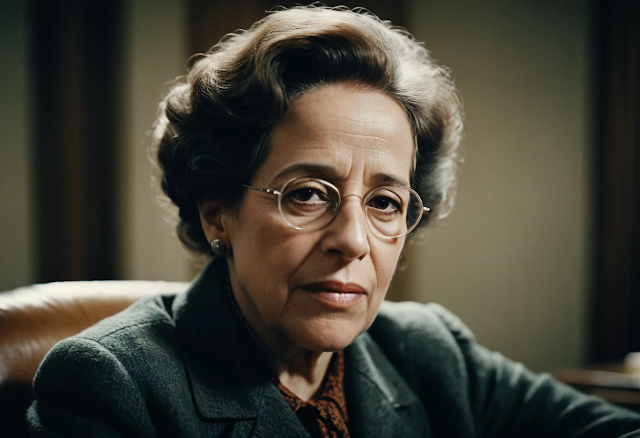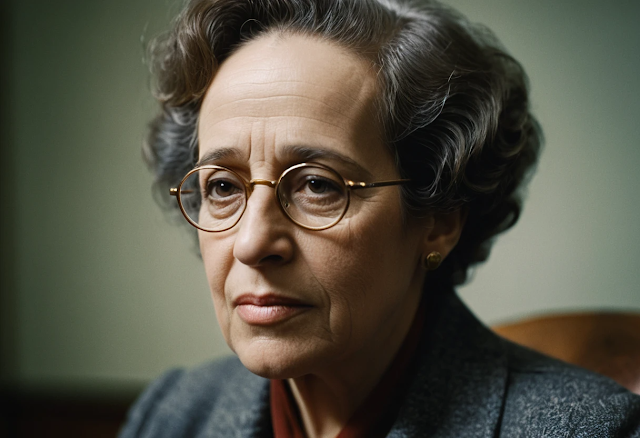The Philosophical Insights of Hannah Arendt
This document explores the profound philosophical insights of Hannah Arendt, a prominent 20th-century political theorist. Divided into five sections, each focusing on different aspects of her thought, this article presents a broad description of her ideas accompanied by ten carefully selected quotes from her works. The sections delve into her views on totalitarianism, the nature of power, the concept of the "banality of evil," the importance of public space, and the role of human action. The conclusion synthesizes these insights, reflecting on their relevance in contemporary society.
Totalitarianism and Its Mechanisms
Hannah Arendt's analysis of totalitarianism is one of her most significant contributions to political theory. She explores how totalitarian regimes manipulate truth and reality to maintain control over individuals and societies. Arendt argues that totalitarianism is not merely a political system but a comprehensive worldview that seeks to dominate every aspect of life.
- "Totalitarianism is a form of government that seeks to control every aspect of public and private life."
- "The essence of totalitarianism is the denial of the individual."
- "In totalitarian regimes, the distinction between truth and falsehood is obliterated."
- "The aim of totalitarianism is to create a new reality, one that is entirely fabricated."
- "Totalitarianism thrives on the isolation of individuals from one another."
- "It is the destruction of the public realm that allows totalitarianism to flourish."
- "The totalitarian state demands absolute loyalty and conformity."
- "In such regimes, the past is rewritten to serve the present."
- "Totalitarianism reduces human beings to mere cogs in a vast machine."
- "The danger of totalitarianism lies in its ability to make the impossible seem possible."
The Nature of Power
Arendt's exploration of power is nuanced and multifaceted. She distinguishes between power, violence, and authority, emphasizing that true power arises from collective action and the ability to act in concert with others. For Arendt, power is inherently linked to the public sphere and the capacity for individuals to come together to effect change.
- "Power is the ability to act in concert."
- "Wherever power is, there is action."
- "Violence can destroy power; it cannot create it."
- "Authority is different from power; it is based on legitimacy."
- "Power is fragile; it requires constant renewal."
- "The public realm is the space where power is born."
- "True power is rooted in the consent of the governed."
- "Power is not a zero-sum game; it grows through cooperation."
- "The loss of power is often accompanied by a loss of hope."
- "Power is the foundation of human freedom."
The Banality of Evil
One of Arendt's most controversial concepts is the "banality of evil," which she introduced in her coverage of the trial of Adolf Eichmann. She argues that evil can manifest in ordinary individuals who accept the premises of their state without critical reflection. This idea challenges the notion that evil is always the result of monstrous intentions.
- "The banality of evil is the phenomenon of ordinary people committing atrocious acts."
- "Eichmann was not a monster; he was a bureaucrat."
- "Evil can be committed by those who simply follow orders."
- "The greatest evil is often perpetrated by those who do not think."
- "Moral responsibility cannot be evaded by claiming obedience to authority."
- "The absence of critical thought allows evil to flourish."
- "Evil is not always dramatic; it can be mundane and routine."
- "The failure to question authority is a breeding ground for evil."
- "The banality of evil reveals the dangers of conformity."
- "To think is to be responsible for one's actions."
The Importance of Public Space
Arendt emphasizes the significance of the public realm as a space for political action and discourse. She believes that a vibrant public space is essential for democracy and the flourishing of human freedom. In her view, the act of coming together in public is a fundamental expression of human dignity.
- "The public space is where we reveal ourselves to one another."
- "Without a public realm, democracy cannot exist."
- "The act of speaking in public is an act of freedom."
- "Public space allows for the exchange of ideas and opinions."
- "The vitality of a democracy is measured by its public discourse."
- "Isolation is the enemy of political action."
- "In the public realm, we find our common humanity."
- "The disappearance of public space leads to apathy and despair."
- "To act is to enter into the world of appearances."
- "Public life is the arena where we can challenge injustice."
The Role of Human Action
Arendt places great importance on the concept of human action, viewing it as the primary means through which individuals can express their freedom and agency. She distinguishes between labor, work, and action, arguing that action is the most significant form of human activity because it has the potential to change the world.
- "Action is the only way to create something new."
- "Human action is the manifestation of our freedom."
- "Labor sustains life, but action gives it meaning."
- "The act of beginning is the essence of human action."
- "In action, we reveal our individuality."
- "Action is inherently unpredictable; it can lead to unforeseen consequences."
- "The capacity to act is what distinguishes humans from other beings."
- "Through action, we can challenge the status quo."
- "The legacy of our actions shapes the future."
- "To act is to take responsibility for the world we inhabit."
Hannah Arendt's insights into totalitarianism, power, the banality of evil, public space, and human action provide a profound framework for understanding the complexities of the human condition. Her work challenges us to reflect on our responsibilities as individuals and as members of society. In an age where the threats of authoritarianism and apathy loom large, Arendt's philosophy remains a vital source of wisdom and guidance, urging us to engage actively in the public realm and to think critically about our actions and their implications.










